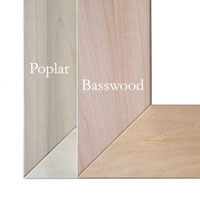How do I place an order?
You can place an order or request a quote for an order through our Request a Quote form.
How do I pay for my order?
After your order confirmation, we will issue an invoice through PayPal. You can pay it using a credit card, regardless of whether you have a PayPal account.
Where are you located?
Our workshop is located in Royalston, Massachusetts, approximately 2 hours North-West of Boston.
What is the difference between Poplar and Basswood?
Poplar and Basswood share comparable structural stability, strength, fine grain, and resistance to warping. Basswood is softer than Poplar, resembling the hardness of Pine. Typically, Basswood is 8% to 10% lighter than Poplar. Historically, rough Poplar lumber was more cost-effective, but recent price fluctuations in lumber have equalized the costs of both woods. Poplar tends to have a cooler color with a greenish hue, while Basswood exhibits a warmer, reddish tone.

How will I receive my order?
We ship our custom stretcher bars unassembled in boxes via UPS. For larger stretchers exceeding UPS's maximum package size, we offer personal delivery within the New England and New York areas. Customers may also opt for delivery or pick-up of assembled, stretched, and/or primed canvases directly from our workshop.
How do I assemble DoubWorks stretcher bars?
Can you stretch canvas and prime surfaces?
Absolutely! We offer canvas Stretching & Priming using our selection of certified Belgian Linens or our #10 or #12 Cotton Duck, and Golden acrylic gesso. Please refer to our Stretching & Priming page for details on these services.
Can I order odd sizes, like fractions or metric dimensions?
Yes! We make every order from rough lumber so each bar is custom cut to any length you need.
What do I do if my canvas loosens after it's been stretched and painted on?
Should your canvas become loose after painting, our stretchers can rectify this issue. The mitered double mortise and tenon joinery, which relies on friction, is designed to expand with the use of the provided keys. Insert these keys into the small square slots found in the joinery of the stretcher bars and braces, then gently tap them with a hammer to widen the joint and tighten the canvas.
What are the benefits of a keyable stretcher?
A keyable stretcher allows you to re-tension your canvas. All joints of our keyable stretchers can be expanded using the provided wedges, or keys. When necessary, the keys are inserted into the joints, causing them to expand and thus tighten the canvas. We find this type of traditional joinery to be superior to other methods used to re-tension canvas. In contrast to mass produced stretcher bars, our bars are meticulously handcrafted to ensure straightness. The mortise and tenon joints are constructed with significant thickness, providing durability to the completed stretcher and, most importantly, allowing the stretcher to maintain its strength with the joints are expanded.
What kind of wood do you use? Are your products sustainable?
We use Tulip-poplar (Liriodendron tulipifera L.) and American Basswood (Tilia Americana), both of which are hardwoods. Poplar is slightly stronger and harder than pine, yet it has a comparable weight. Its excellent dimensional stability is proven by its centuries-long use in the interior casework of fine furniture. Poplar and Basswood share similar structural stability, strength, fine grain, and resistance to warping. Basswood, however, is softer than Poplar, resembling the hardness of Pine. On average, Basswood is 8% - 10% lighter in weight than Poplar. Poplar grows on the East coast, near our shop, reducing the transportation distance for its final use. As a fast-growing tree that grows tall and straight. Poplar's proximity to our shop and rapid growth rate makes it an environmentally friendly and sustainable choice as a renewable resource.
Is it possible for stretchers to warp?
All wood responds to changes in humidity, irrespective of the species or origin. The key is to choose a wood the possesses the necessary qualities. Selecting the right species is the initial critical step to create a stable object. Subsequently, within that species, choosing wood with straight and consistent grain is vital.
At DoubWorks, we utilize two types of wood known for minimal seasonal movement, yet they also offer the required characteristics for stretcher bars, such as strength and resistance to bending. A stretcher bar with a spiral grain can twist due to the wood's expansion and contraction with humidity variations, leading to what is referred to as "warping." This warping manifests when three corners of the frame sit flush against the wall, while one corner stands off.
This issue isn't due to insufficient internal bracing, whose main role is to counteract the bar's bending from canvas tension. Seasonal movement can also cause bending, for instance, when wood grain encircles a knot, potentially leading to a bend with humidity shifts.
So, can DoubWorks stretchers warp? While any wood can potentially warp, our meticulous selection of species and grain, coupled with our precise in-house milling that yields perfectly straight bars, significantly reduces the likelihood of our stretcher bars warping.
How much do your stretchers weigh?
Our 1.5" Original Profile poplar stretchers weigh approx. 0.75 lbs. per foot. For example, a 36" x 48" stretcher would weigh about 10 lbs. The Basswood equivalent stretcher would weigh 8%-10% less.
Can I pick up my order?
You are welcome to pick up your order at our workshop in Royalston, Massachusetts. Please let us know your pick-up preference when placing your order.
Do you deliver?
We deliver orders for $1.25/mile round trip from Royalston, Massachusetts to New England and the New York region.
Are your stretcher bars made in the USA?
Yep. All right here in our workshop.
Please let us know if you have any questions and we'll get back to you shortly!

